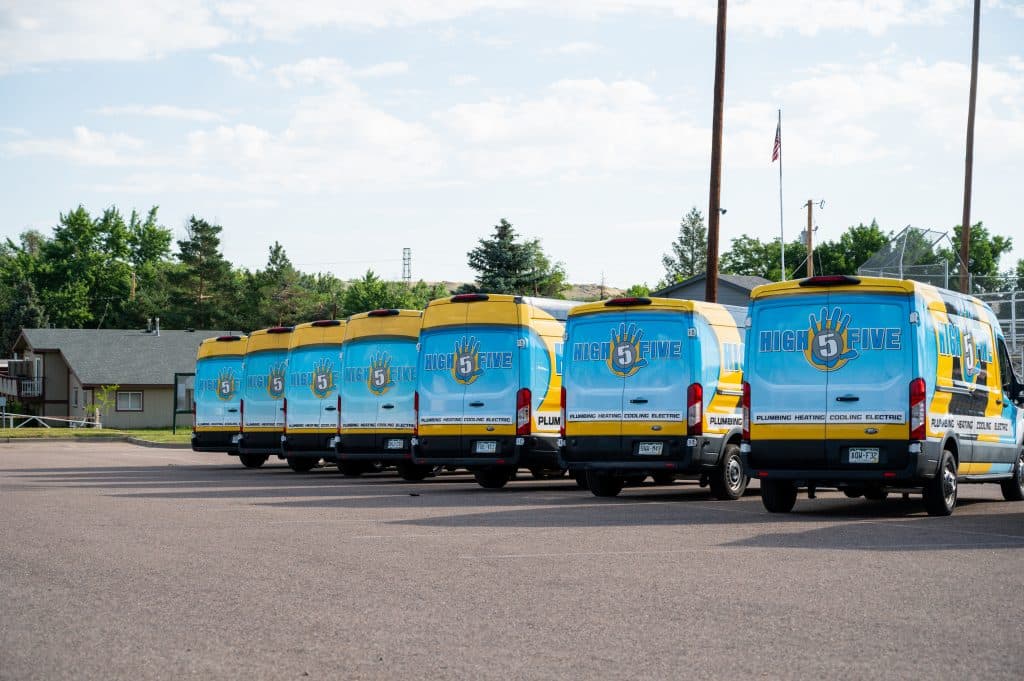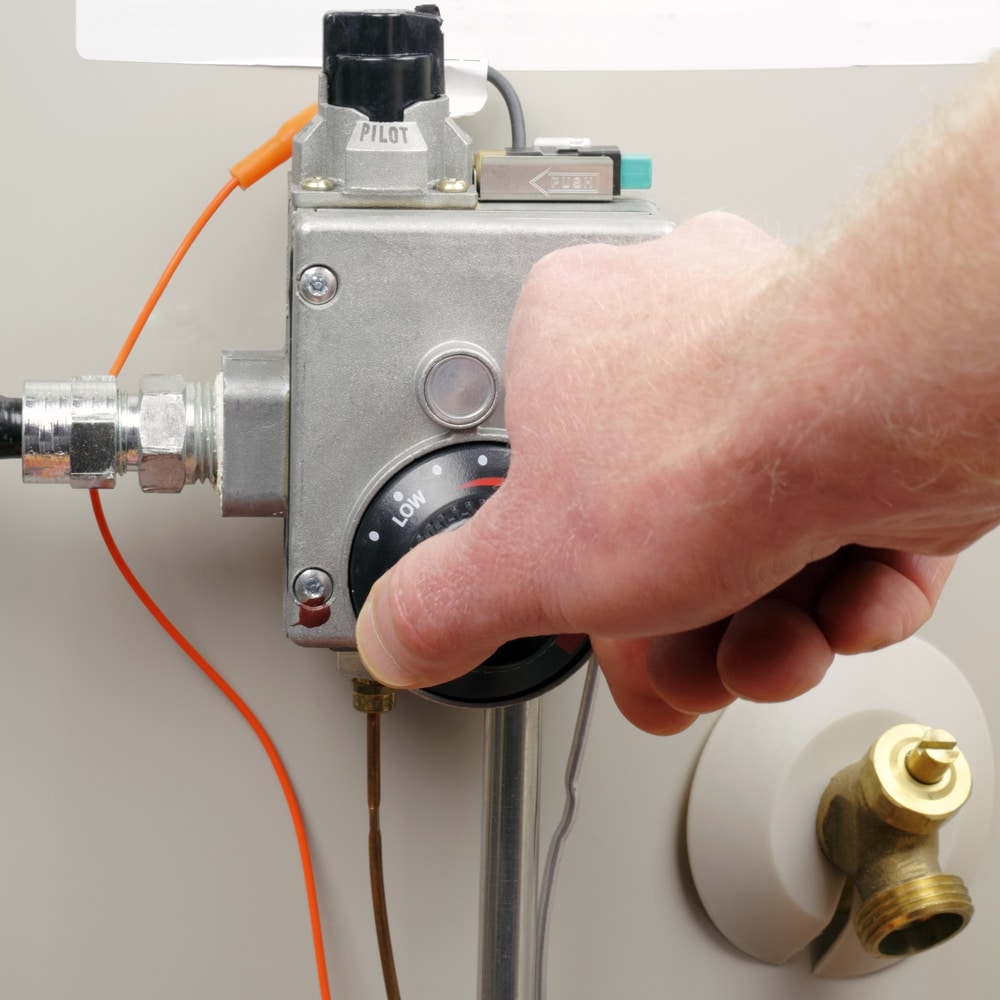Hot water powers your household’s showers, dishwashing, and laundry, but it also drives your energy bills up, sometimes accounting for 18% or more of your annual energy consumption. Whether you’re comparing different types of water heaters or trying to lower your monthly bills, understanding how much electricity a water heater uses helps inform important household choices. At High 5 Plumbing, we help homeowners across the Golden and Denver area stay comfortable year-round with expert advice and reliable plumbing services.
Basics of Water Heaters
Water heaters supply heated water to your home’s fixtures and appliances, including sinks, dishwashers, and washing machines. Depending on the type of water heater, these units either keep hot water ready or heat it on demand. Several types of water heaters are available, each differing in design, fuel source, efficiency level, and ideal application.
Tank Water Heaters
Storage tank water heaters are the traditional and most widely used type of water heater. These units feature an insulated tank that stores a specific amount of hot water, usually between 30 and 80 gallons.
Gas water heaters use natural gas to fuel a burner located under the tank, which heats water and maintains its temperature. These systems tend to heat water more quickly than electric models since gas burns hotter than electrical resistance coils, and they’re especially common in areas where natural gas is accessible.
Electric water heaters use electric resistance heating elements to warm water in the tank. They offer lower installation and maintenance costs compared to gas. Electric units can be a smart long-term choice in areas where electricity is cleaner or cheaper. However, these models don’t heat as powerfully as gas units.
Tankless water heaters
Tankless or on-demand water heaters don’t store hot water. Instead, these models heat water as needed. They provide 2 to 5 gallons of hot water per minute, with gas models representing higher flow rates. Some households use only tankless water heaters and install one or more throughout their home, usually near high-demand areas. Others use tankless units to supplement existing storage tank heaters.
Factors Influencing Energy Consumption
Several factors influence water heater energy consumption — some depend on the unit while others relate to household habits.
Water heater type
Storage tank water heaters experience standby energy loss but tankless systems avoid this issue altogether. Both types offer high-efficiency models and feature advanced technology and engineering designed to reduce energy consumption.
Water heater size
Larger tanks store more hot water and generally require more energy to heat and maintain water temperatures.
Usage habits
Your household’s hot water habits directly influence the amount of energy your water heater uses. For example, long showers and frequent laundry both increase hot water demand.
Water heater age and condition
Water heaters lose efficiency as they approach the end of their expected lifespans. Older systems may also lack advanced insulation, controls, and components found in newer models, which often use less energy to provide comparable hot water heating.
Temperature settings
Water heaters often have 140-degree default thermostat settings. For storage tank units, higher temperature settings translate to increased energy consumption to initially heat water and continue heating while on standby.
Insulation and location
Water heaters lose heat through tanks and pipes located in cold garages or basements. Without adequate insulation, your water heater may consume more energy to counteract these losses.
Calculating Water Heater Energy Usage
Gas heaters generally cost less than electric models, but savings depend on your energy rates, heater efficiency, and household usage.
Estimating electric water heater usage
Electric water heaters range from 1,000 to 4,500 watts or 1 to 4.5 kilowatt power ratings. To calculate energy usage, multiply the power rating by the number of hours it runs per day. Then, multiply by your electricity rate to calculate the cost per kilowatt-hour.
If your 4.5-kilowatt water heater runs for 2 hours per day, it consumes 9 kilowatt-hours per day. Colorado averages about 15 cents per kilowatt-hour, so your water heater costs approximately $1.35 to run per day. Over a year, that’s about $490.
Estimating gas water heater usage
Gas water heaters are measured in British Thermal Units (BTUs), averaging 30,000 to 40,000. Multiply the BTU ratings by the hours run per day, then multiply by your gas rate.
For example, a 40,000 BTU water heater runs for 2 hours daily, which is 80,000 BTUs per day. Divide by 100,000 to convert to therms — in this example, your heater uses 0.8 therms. If you pay $1 per therm, your water heater costs about 80 cents per day or approximately $292 yearly.
Tips for Energy-Efficient Water Heater Use
Use these strategies to improve your water heater energy efficiency and lower your utility bill:
- Install low-flow showerheads and faucet aerators.
- Use cold water laundry settings when possible.
- Lower the water heater thermostat to 120 degrees.
- Fix leaks promptly.
- Insulate your water heater and pipes.
- Schedule regular water heater maintenance.
If your water heater is over 10 years old, consider switching to an ENERGY STAR-certified unit. These models meet strict energy standards and often include added features like programmable settings or heat pump technology.
Need Help Choosing the Right Water Heater? Contact the Plumbing Team at High 5
When your water heater needs maintenance, or you’re ready for an energy-efficient upgrade, the High 5 Plumbing team is ready to assist. We offer comprehensive and expert plumbing services, and our licensed plumbers focus on what’s needed and the most effective solutions. True to our core values, we deliver affordable and upfront pricing and work hard to earn our customers’ trust and satisfaction. Contact us or schedule a plumbing service today.


